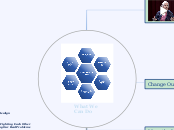rWhile solutions-oriented, appreciative thinking plays the critical lead in successful action, the more critical, skeptical demand for rigor and caution is as essential to success. Risks to be anticipated come in several forms:Unacknowledged conflicting needs and interests, misunderstandings, and interpersonal concerns, "feelings" and "histories" can impede essential collaboration. Creating space to work through and "harvest" substantive differences advances the planning. Time, safety and skill in exploring and where possible healing or at least accepting interpersonal differences grows the community that is itself among the critical goals of the work itself as well as allowing collaboration to continue.Things may not work as planned--in fact they usually don't. Backup plans may help. Readiness to learn and to adapt makes the unexpected often the very source of new breakthroughs. Such readiness is a matter both of ongoing efforts to stay centered, connected and open."Due deliberation" or "doing the homework" is our best effort, within the time and accessibility to information available, to at least minimize forseeable error.The powers aligned against deep systems change are vast and multi-faceted, usually subtle, and sometimes lethal in how they work. We can only study them, try to outguess them in our planning, and strengthen ourselves through centering, mutual support, and practice. Hence the often critical importance of on-going personal growth and training in communication, organizing, non-violence, and strategic action.
